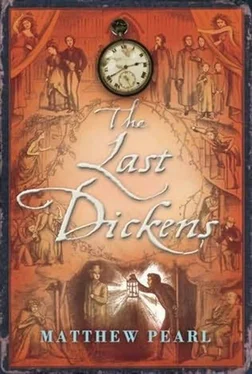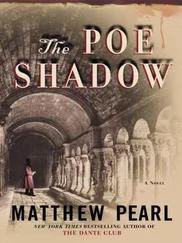“Thank you.” Taking the requested tool, Osgood carefully put the blade to the end of the pen. “Hold the lens over this spot, please,” Osgood said.
Peeling the surface of the nib, layers of blue ink fell away.
“There!”
The blue began to give way to layers of brown.
“Look,” Osgood said excitedly. “Look what's underneath.”
“It's brown, ” Rebecca replied with disappointment after examining the underlayers of the tip under the light.
“Just a moment, Miss Sand.” Osgood walked to a table at the other end of the library office and carried over a carafe of water and a stout glass. He poured a small amount of water into the glass, after which he swirled the tip of his finger until it was wet. He then removed that finger from the glass and rubbed the peeled nib of the pen. As it became wet, the dry brown slowly turned purple black.
“See!” Osgood said, displaying the evidence.
“It's black!”
“That's iron gall, the same ink supplied at Parker's! When iron gall dries and hardens, it turns to a brownish maroon color. I think he used this pen in Boston,” Osgood declared. “This may very well show Tom Branagan was right! Drood ended before it began! When Herman went to Gadshill and Forster's office, he was looking for the wrong type of clue-he shouldn't have been looking for a piece of paper that might tell him what Dickens had planned for the rest of the book, but the very pen itself with which he had written it. This ink points us not back to England but right where we're headed!”
“You think it possible he had written the second half first while still in Boston?” asked Rebecca.
“When I asked him if there was any place he hadn't seen in Boston, he said he wished to see the Harvard Medical College where the infamous murder of Parkman had occurred,” Osgood mused. “He had also mentioned to us that he was preparing a new reading about Bill Sikes murdering Nancy from Oliver Twist. Perhaps the Chief had such murder stories on his mind, not only as a matter of local curiosity, but because he was already writing one himself! That is what brought Poe to his mind to begin with in his conversation on the train with Mr. Branagan and Mr. Scott!”
“Mr. Osgood, You've done it!” Rebecca exclaimed. “Even if this is true, he didn't tell Mr. Forster or anyone else that we know of, where those pages are. We wouldn't know where to begin to look.”
“Who else might he have told?” Osgood wondered out loud.
“What about Mrs. Barton!” Rebecca cried out.
Osgood looked over at her with surprise and shook his head. “The deranged reader? I can't imagine a less likely candidate for him to entrust his secret with, truly.”
“I recall hearing at the office what Mrs. Barton had wanted that night. She was writing nonsense that she believed-in the disordered folds of her mind- was the next Dickens novel. She believed his next book had to be her next book: that they were one and the same, that the line between reader and writer had been erased. Mr. Branagan described Mr. Dickens having a gleam of sympathy in his eyes for the poor soul and he leaned in-after she had cut her own throat and it seemed every drop of her life was dancing out of her, she managed to ask about his next book-and he whispered to her.”
“But Mr. Branagan said he hadn't heard what it was Mr. Dickens whispered.”
“No, Mr. Osgood, but it might have been…” Rebecca said, bracing herself for the possibility, and willing herself the bravery to propose it. “If he was already writing Drood , it just might have been related to it, to put her at ease before she died. She may have received the answer we have been searching for-waiting for us back home in Boston!”

Bengal, India
THE RAIN HAD BEGUN AGAIN. AT THE JAIL IN BENGAL, THIS WAS a particular annoyance for the sentries on their rounds on the roof. On this day, the sentries were Officers Mason and Turner, of the mounted police patrol. As they passed each other, Mason paused to gripe.
“Three days in a row to have guard duty! It's not right, Turner, when you're a mounted man! That superintendent Dickens is a damnable fool!” Mason cried, hanging on to his hat to keep it from blowing away with the wind. “I thought he was a good man, I vow I had, until now.”
Turner stared up at the sky. Though it was the middle of the afternoon, it could have been midnight it was so dark; the flash of lightning, and then a fast peal of thunder shook the rooftop. The storm was as bad as they had seen all season. “There aren't good men in the public service, Mason, I suppose,” he said with a bitter tongue.
“I'm going into the box until it stops. Won't you come?” Mason asked. “Turner, what's that?” Mason was looking at Turner's carbine, with its bayonet fixed. “You know you can't have the bayonet up here. It's in the rules. It can attract lightning.”
Turner screwed his eyes and looked away from Mason. “That damned dacoit is in this jail. The one who stole the opium.”
“So?”
“They blame us for having let him flee in the first place, but he's more dangerous than they know. I'd like to speak with him.”
“We're on duty! Now come on into the box!” Mason shouted to be heard over the sound of the storm.
Before Turner could reach the door down into the prison, it opened and a man stepped out. The crackling light from the sky showed it to be Frank Dickens.
“See here, Mr. Turner,” Frank said. “You will be glad to know we recovered the stolen opium chests from where they had been buried in the ground.”
Turner's eyes showed signs of relief.
“The case is not closed though, I'm afraid,” Frank continued. “You see, in the bungalow of Narain, the thief that leaped from the train window, I found several books-and annotations inside them. Records in the margins, actually, of transactions and bribes to officials, native and European. In another book was a record I have deciphered with great effort, of a recent bargain with you.”
Turner shook his head vigorously. “I don't know what you mean!” Mason, coming back out into the rain from the shelter of the guard box, moved closer and listened.
“You volunteered,” said Frank calmly, “after the opium convoy had been robbed, so that you could see to it that the thieves escaped. However, with Mason at your side, you had no choice but to arrest one of them. You told Narain, when you were alone with him on the train, that if he said your name to anyone in the police, you would kill him. You told him if he wanted a chance at survival, he could jump from the train. He had a one in ten chance to live, I'd say.”
Frank removed a stone from his pocket and placed it in Turner's trembling hand.
Frank went on. “Only the other thief, who goes by the name of Mogul, escaped. He had known nothing of Narain's arrangement with you until after the theft, and that was what their argument was about that detained them at the receiver's house. In fact, Mogul was so fearful of you that after I captured him, it was only when he saw you waiting outside the interrogation room that he confessed to the inspector. It was you that scared him far more than his trial on the chabutra. If you had caught him in the mountains, I have no doubt he would have met the same fate as his accomplice by your hand. I wish to know this. Was it Hurgoolal Maistree who was directing the scheme?”
Turner evaded Frank's glance.
“Ingenious,” said Frank admiringly. “Maistree, the receiver, had instructed the thieves to take only a few of the opium balls from each chest, replacing the others with rocks like this one. This way, if the chests were found, we could consider the case finished and perhaps not even notice the rocks until later examination, when we were occupied with new excitements. Meanwhile, he had paid you to pass along information about when the convoy would be at its most vulnerable, and to ensure that his thieves were not captured. With the total number of opium balls he had received, for which he paid the thieves perhaps less than a third of their value, he would have enough to make a substantial sale to a smuggler, and a big profit for himself.”
Читать дальше













